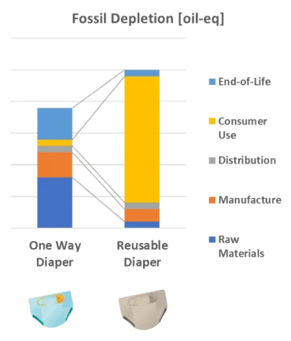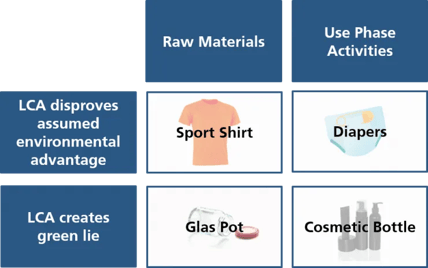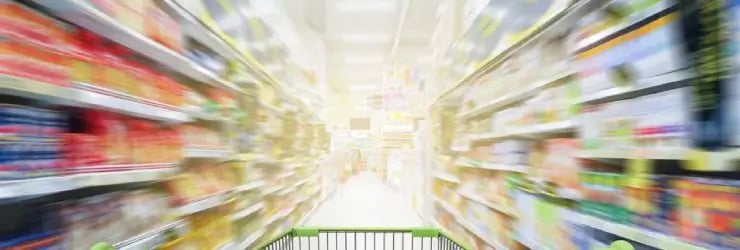As life cycle experts know, Life Cycle Assessment (LCA) is a useful tool to either confirm or disprove a product’s assumed environmental advantage. Consumers, too, are increasingly looking to LCAs when it comes to choosing a product with less environmental impact. What they often don’t know: LCAs can also create or support ‘green lies’. Buyer beware!
A life cycle perspective for transparency issues
On June 26, 2019, ifu Hamburg, Member of iPoint Group, held their Life Cycle Workshop at the Stadthalle Reutlingen. The event brought together more than 50 life cycle enthusiasts from the fields of industry, research, and consulting to exchange their experience and knowledge about topics concerning Life Cycle Assessments.
This year, the workshop was part of the fw:transparency event, a joint event by ifu und its parent company iPoint, which focused on business transparency in the context of sustainability and compliance. Consequently, the Life Cycle Workshop’s main focus was “Transparency requires a life cycle perspective”.
The nature of green lies and the role of LCAs

Marten Stock has been a senior member of the team at ifu Hamburg since 2009 and can look back on many years of expertise in sustainability consulting. He advises both SMEs and large corporations on how to utilize resources more efficiently and how to produce more environmentally friendly products. In his presentation “Does an LCA reveal green lies?”, Stock cast light on a not-so-well known side of LCAs.
“When talking about green lies in this context, we are not referring to lies in the usual sense”, he explained. Rather, a green lie refers to the “assumed environmental advantages of a product system (as compared to other product systems), which turns out to be wrong.”
How is that possible? Life Cycle Assessments are based on a complex methodology and rarely deliver clear-cut results. By nature, the outcome of an LCA depends in part on uncertain variables that can’t be accurately defined or measured. These arise particularly during a product’s use phase, when manufacturers can’t know exactly how a customer might use, clean, operate, or maintain a given product and therefore have to base part of their data on a set of standard assumptions.
In his presentation, Marten Stock highlighted the problem with four case studies. These were intentionally fictionalized in order to protect privacy, but are all based on real-life studies and projects.
What an LCA can tell about a product’s sustainability
The first example is a comparison of two active-wear T-shirts: one made of primary PET, the other using recycled PET fibers. We automatically assume the shirt made from recycled material is more environmentally friendly and has a smaller carbon footprint. Not necessarily!
Clearly, the recycled PET version has the advantage of using less raw martial during its production phase; that impact is roughly one third of the T-shirt made from primary PET. Yet the biggest single environmental impact is actually during the use phase (washing), which is the same for both versions and easily overwhelms raw material from the cradle-to-grave perspective.
Additionally, the factory producing the recycled shirts operates with less energy efficiency, which results in a greater overall impact during the manufacturing phase.
This is a good example of how an LCA can disprove an assumed environmental advantage. “It also shows consumers how there are always many factors at play and that you need to look very closely at any LCA’s underlying framework,” Marten pointed out.
The diaper debate: single use vs. reusable materials

The next example tackles a well-known question, and most people believe reusable cloth diapers are better for the environment than the throw-away counterparts. If you’re just looking at the manufacturing side, the cloth diaper uses a fraction of raw materials (over one year). But the biggest impact, again, comes from the use phase: cloth diapers and the cotton inlays will be pre-soaked, rinsed and then washed many times over, requiring a large amount of (mostly) warm and hot water – resulting in high energy use.
However, this particular Life Cycle Assessment contains a major degree of uncertainty because how users actually wash reusable diapers is unknown, and their applied methods could change the outcome of the LCA considerably.*
* (For the LCA experts among our readers: these examples are intentionally kept simple so they’re easier to understand. Of course, there are a lot of additional variables that have an impact, such as the energy mix used for washing, etc.)
LCAs can create green lies by conveying false or incomplete information
The first two examples focused on recycling materials and how LCAs can reveal some products to be less green than consumers might think they are. The next two case studies deal with sustainable packaging and show that LCAs can indeed create ‘green lies’ as Stock calls them – essentially, giving the wrong impression by focusing only on part of the overall life cycle.
In a comparison of cosmetic packaging, consumers would correctly assume that lighter, simpler tube packaging uses less raw material than a heavier dispenser bottle. Thus, from the cradle-to-gate approach the squeeze tube wins the carbon footprint race.
However, if you widen your perspective to include a cradle-to-grave view, the dispenser bottle has a better emptying percentage, so results in far less product waste over time and, thus, a lower climate change impact. Two different LCA approaches, two different outcomes.
The last example addresses the question of which is the more sustainable packaging choice for yogurt: glass or plastic? Most consumers favor glass, as they believe the material is more recyclable. Yet, in each of its life cycle phases, the plastic container actually has the environmental edge with lower impacts.
At least until you factor in a variable that doesn’t yet show up in any LCA: the CEO of the exemplary company is very concerned about the increase in macro- and micro plastics in ocean environments and has a strong ethical stand against using plastic containers. So far, LCAs are not able to factor in things like the impact of dispersed plastics breaking down in the environment. Once more such factors become accountable, it will be a whole different picture.

Want to uncover the full truth behind a product’s environmental impact?
With Umberto, our powerful LCA software, you gain transparency across the entire life cycle — and the tools to reveal or avoid green lies. From raw materials to end-of-life, Umberto helps you make informed, data-driven decisions for truly sustainable products.






